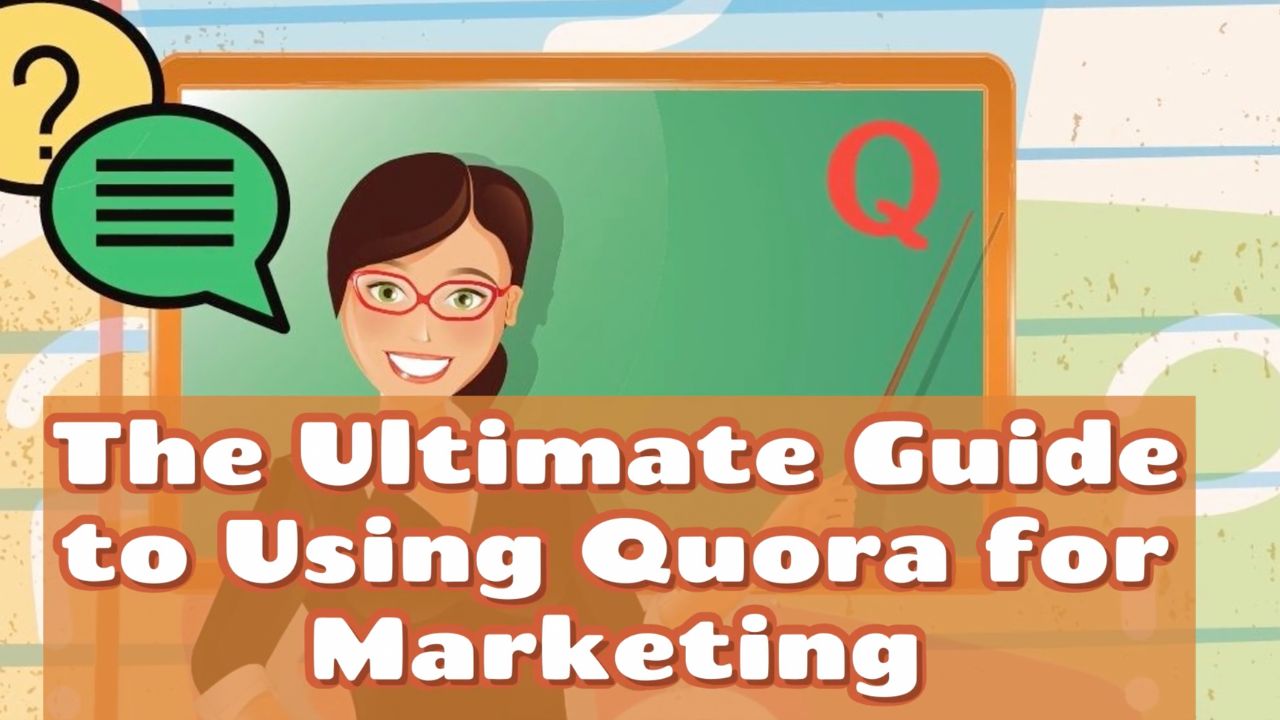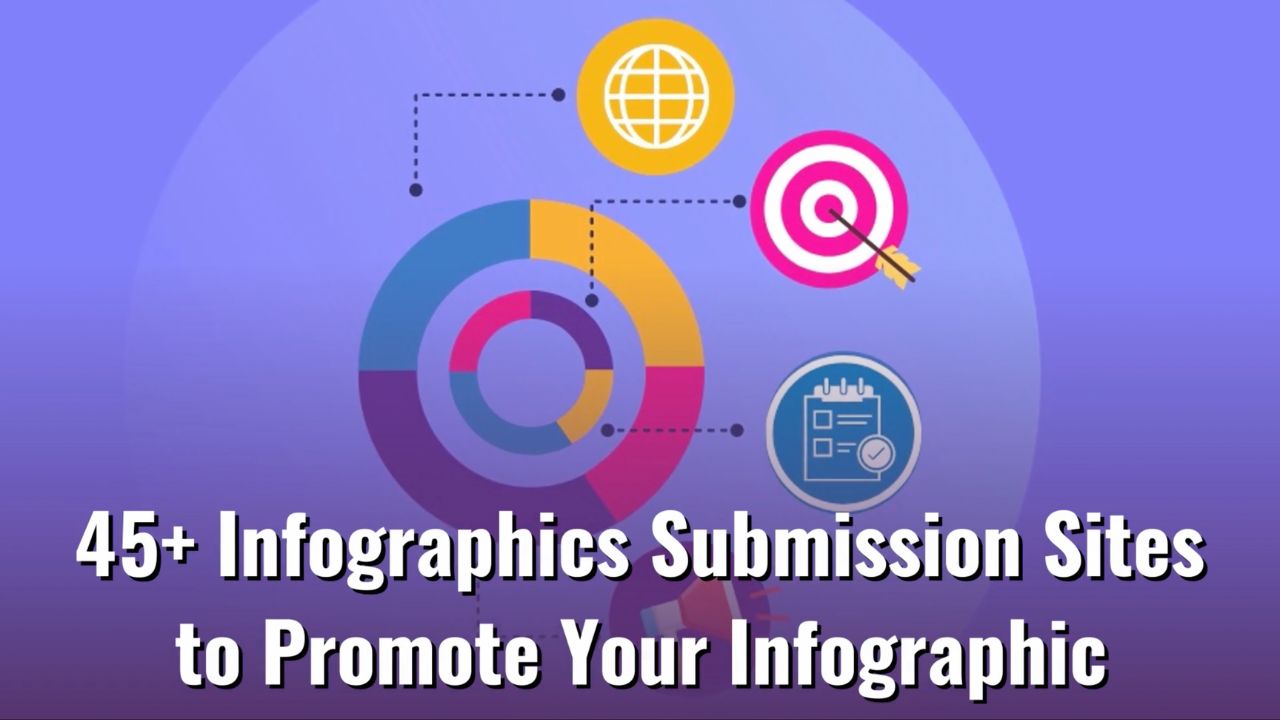Quora is one of the top few hundred sites in the world, with 400 million unique monthly visitors and a valuation in Silicon Valley of $2 billion.
It’s based on a question-and-answer format that also incorporates common characteristics of social media platforms to help drive interactivity and engagement.
The site has a good level of authority, with questions on the platform regularly ranked on the first page of Google.
Even presidents have been known to use it.
For marketing, Quora forms a useful part of your content marketing workflow, helping to:
- Grow your online visibility
- Attract traffic back to your website
- Gain insights into your market
However, approaching it in the wrong way can lead to your answers being deleted, and even an account ban.
This guide to using Quora for marketing aims to show you:
- How to use it in the right way for effective, long-term benefits for your business
- How to avoid the common pitfalls that many users unfortunately stumble into

You’ll find out:
- Why Quora should be part of your content marketing strategy
- How to create and set up your Quora account in the right way—there are some specific aspects to take care of to maximize the business benefits
- How to use Quora effectively for marketing—including growing online visibility, driving traffic back to your website, generating leads, and using Quora for research
Why Quora Should Be Part of Your Content Marketing Strategy
Unlock Your FREE Custom Quora Marketing Action Plan
Want a personalized roadmap? Answer 3 quick questions, and get a tailored step-by-step strategy to leverage Quora for your business—it's 100% FREE!
Just hit the button now—it only takes a few seconds! →
Quora is a growing website.
The original version of this post was published in 2021, with the information at the time indicating 300 million unique monthly visitors. That's since risen to 400 million.
The good news is that Quora can be useful for marketing purposes too, as long as you approach it right...
Quora has been nothing short of a miracle for me. I get enough queries via Quora that I have to decline clients, referring them to other specialists. How cool is that?
I've had job offers, consulting offers, offers to move, offers to head small companies, offers to speak, offers to write a book, offers to do lectures, offers to make instructional videos, offers to partner-up, offers to be a board member, offers to be on the advisory board, offers to take equity...
...invitations to come and speak here, or come and speak there, or moderate this forum here, or come as a phone-in guest there, etc. are all over the place. I try to appease as many as I can.
Faisal Khan, Banking, Payments & Fintech Consultant
Its user base is relatively affluent with more than half of its users coming from households with six figure incomes.
And visitors from the United States make up over a third of Quora’s traffic, or around 150 million unique visitors a month.

For businesses focused on the US market, that’s significant.
Quora answers to search queries are regularly ranked on Google’s first page. The value’s in the long-tail keywords.
And, based on previously-available (since deleted) Alexa data, over 60% of Quora’s traffic came from search.
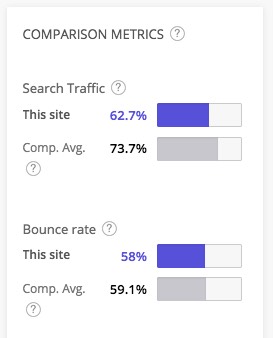
In other words, Quora can be very advantageous for marketing. It only takes a few minutes to repurpose content for the site (you'll soon find out how)... and you can start taking advantage!
So what are the benefits exactly?
Let’s run through them…
Traffic
Publishing content on Quora can generate website traffic too in three different ways:
- By displaying your domain name within the credentials shown above answers
- By linking back to your website via your profile
- By linking to longer content on your own website from within your answers
As you'll discover below, this is long-term traffic too.
Answers you publish on Quora can continue to attract hundreds of views several years later.
You'll find out how to approach all of this shortly, as well as how to use Quora for…
Lead Generation
Naturally, if you’re attracting traffic to your website, you can convert some of those visitors into leads.
You'll discover two ways to do this for links from Quora below.
What About the SEO Benefits?
While Quora provides you with increased search engine visibility via your answers, you shouldn’t expect it to give your own website ranking a boost (here's how to really get your website on Google's first page!).
At least not directly, as links from Quora are no follow with no direct value for SEO purposes.
However, by growing a solid body of content on Quora that positions you as an authority in a particular topic, the chances of other content creators finding your blog in the course of their own research on the platform and then linking to you as a result, increases.
And attracting those kinds of links do help your SEO.
Which leads to…
Using Quora for Research
A popular use of Quora is as a research tool to help uncover relevant topics to create content about.
It gives you a direct insight into exactly what people want to know about in your market.
In fact, it provides an almost limitless source of new content ideas, as well helping to validate other ideas you come up with.
You'll find out how to do this soon.
But first, you need an account.
Unlock Your FREE Custom Quora Marketing Action Plan
Want a personalized roadmap? Answer 3 quick questions, and get a tailored step-by-step strategy to leverage Quora for your business—it's 100% FREE!
Just hit the button now—it only takes a few seconds! →
So let’s run through how to get one...
How to Create and Set Up Your Quora Account
Create an account on Quora by clicking on the Google or Facebook buttons, or via the Sign Up With Email link.
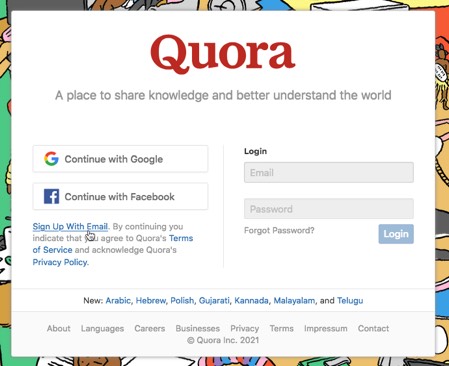
After signing up, you then need to select a minimum of ten topics of interest.
As you'll be using Quora for marketing, choose topics relevant to your business and the interests of people in your market.
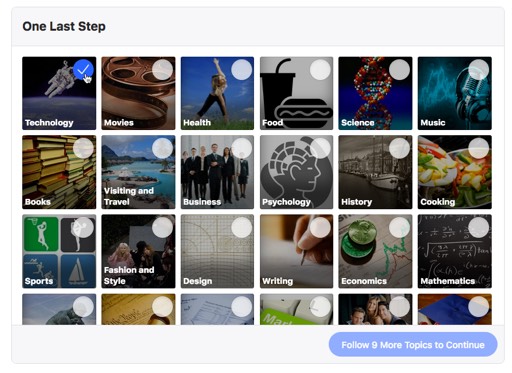
Scroll down for more topics, selecting all those that are relevant.
However, don't spend too long on it.
You’ll find that each time you select a new topic, others are added underneath (such as sub-topics of those already selected), and the list of available options becomes endless.
So, once you’ve selected all the main ones, click to continue.
But before you start answering (and possibly asking) questions, the next step is to...
Add Your Bio
Click your profile top right, and click through on your name.
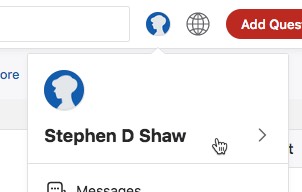
First, upload a profile picture.
Use a personal photo rather than an anonymous avatar or business logo.
![]()
There are then a couple of other bits to add.
Both can be improved over time, so don't spend too long or get too hung up on what to write. For now just add some basic information about yourself to get started.
The first is your profile credential—click on the Add profile credential link.

Enter something about yourself to help boost the credibility of your answers and illustrate your expertise.
You have a maximum 60 characters available, so it needs to be short and succinct.
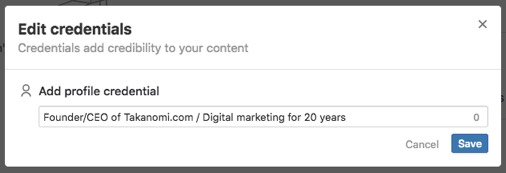
While it won’t be linked, this is an opportunity to mention your domain name so that people can look up your website if they want to find out more about you.
(As you’ll recall, this is one of the ways in which Quora can help drive traffic back to your website).
This credential is shown on your profile, and can also be selected as the credential to show above an answer you provide.
(Or you can enter and select another).
More on that soon.
After entering your profile credential, click on the Write a description about yourself link.
This opens a bigger editor, in which you can enter a longer section of information about yourself.
You can add active links, images and even a YouTube video (simply enter the video link).

Some people reading your answers will click through to your profile to find out more about you.
Use this space to:
- Build credibility and authority—provide information that serves to illustrate your level of expertise.
- Link through to content and profile pages you have on other platforms, whether social profiles, your blog, your YouTube channel and so on. As an example, here’s how Gary V approaches it on his:

For links back to your own website, see the Tracking Quora Traffic section below for information on how to use Google Analytics to measure the traffic you get from Quora.
Unlock Your FREE Custom Quora Marketing Action Plan
Want a personalized roadmap? Answer 3 quick questions, and get a tailored step-by-step strategy to leverage Quora for your business—it's 100% FREE!
Just hit the button now—it only takes a few seconds! →
With your account now set up, you can now start...
Using Quora for Marketing
Finding Suitable Questions
There are two main ways to find suitable questions to answer.
The first is via the Quora answer icon at the top of the page.
![]()
This will show questions related to the interest areas you selected on registering with the site. Most of these will show recent activity in terms of someone following that question.
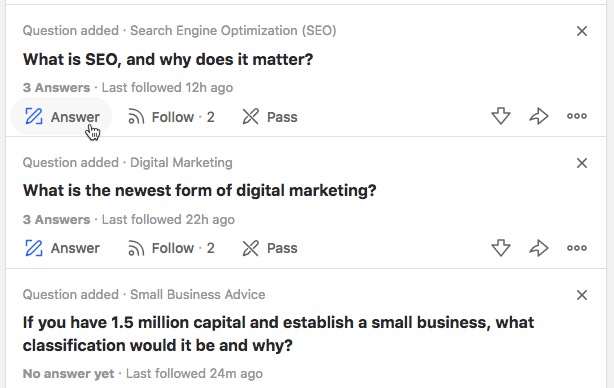
If someone follows a question, it means they will get a notification each time someone answers.
The second way to find questions is by using the search facility, and entering relevant keywords.
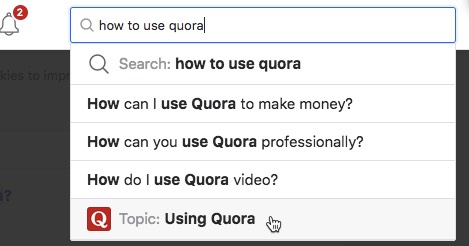
As you type, suitable questions will be displayed, and often a wider topic area too.
However, by clicking the top option for a straight search, you’ll see a longer list of potential questions.
These will display either a sample answer, or the current follower count, with some of the most popular questions shown at the top.
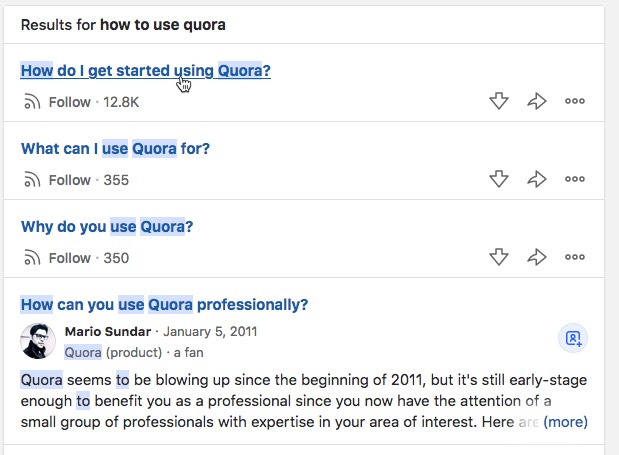
Generally speaking, those with higher follower counts tend to attract the most answers too.

While you may get some short-term advantage from all the notifications those followers receive, it can be harder to get your answer ranked and achieve visibility longer term.
However, those questions also get more traffic… so in the end it’s a balancing act.
A useful tactic is to focus on questions which have so far attracted a handful of followers and a few answers.
It’s a bit like choosing long-tail over short-tail keywords for SEO.
There’s also a third way of finding questions—or rather, the questions find you.
But it doesn’t start happening straight away.
Once you’ve provided a few answers and have been active for a while, you’ll likely start receiving direct requests from people to answer their question.
These are sometimes referred to within Quora as A2As—or ‘Ask to Answer’.
For example, after being on the platform for some time, I now get several A2As a week.

Not all will be suitable, but they’re at least an additional opportunity to consider.
If you don’t want to receive email alerts when you get a new A2A, you can turn it off in Email & Notifications on the Settings page (available by clicking on your profile).
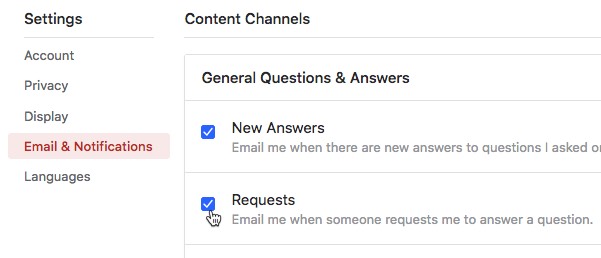
Answering Questions
Answering a question on Quora is very intuitive.
Simply click the Answer button beneath the question, formulate your answer, and click Submit.
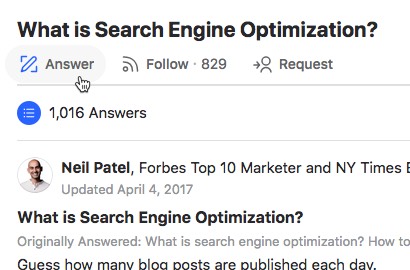
However, before clicking Submit for the first time, you also need to either pick a credential to use, or add a new one.
Otherwise your answer will just show your name.
Click the Edit Credential link at the top of the answer box, under your name.
If the profile credential you entered previously on creating your account is relevant to the question, select that one.

Or if there’s a different credential that would better illustrate your expertise in relation to the question, click Add a credential, and then select Topic from the dropdown.
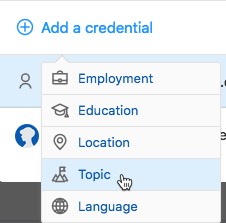
In Select a topic, just start typing, and a list of possible topics to select from will appear.
Then enter some relevant information into the Describe an experience field.
This will likely be similar to your profile credential before, but more topic-specific.
Again, you’ll likely want to mention your domain name so people can look you up if interested.
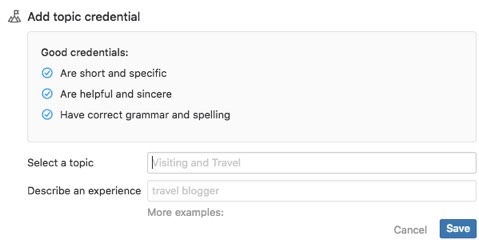
Unlock Your FREE Custom Quora Marketing Action Plan
Want a personalized roadmap? Answer 3 quick questions, and get a tailored step-by-step strategy to leverage Quora for your business—it's 100% FREE!
Just hit the button now—it only takes a few seconds! →
Contribute Regularly and Consistently
As with most content platforms, the greatest benefits come through regular and consistent action.
For example, when I first started on the platform a few years ago, my views rose steeply once I started regularly contributing.
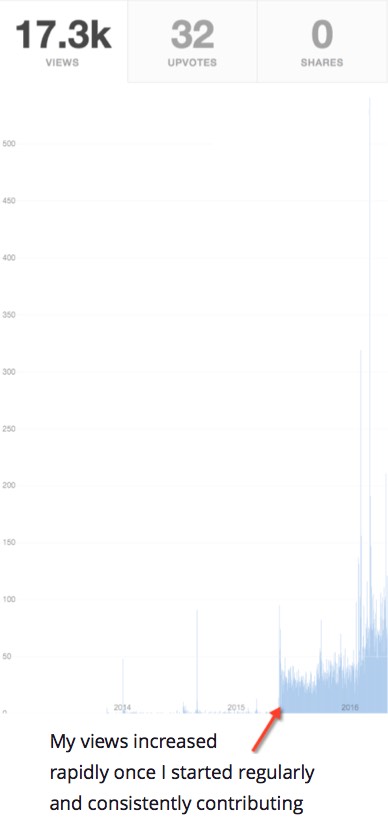
It’s not a short-term effect either.
Years later, I’ve since amassed millions of views, and get hundreds of views a day to the questions I’ve answered.

The key to regular and consistent action is to simply make Quora one of your post-publication actions for your seed content.
(Your seed content is a main piece of content published on your primary platform, usually a blog for your business, that you then repurpose for multiple other platforms).
So each time you publish say a blog post, you or someone on your team can look for a relevant question or two on Quora that the post can then be repurposed to answer.
Answer Length
An answer to a question does not have to be long, difficult to create or time-consuming.
First, if repurposing content from elsewhere, you already have the source material from which to formulate a suitable answer.
Second, it’s important to answer the question directly, clearly and succinctly, rather than to add unnecessary fluff.
Sometimes though, to answer the question fully—particularly for more open-ended questions—you may well need to provide a longer, more detailed answer.
In fact, doing so can attract a significant number of views, upvotes, shares and other types of engagement.
As an example, consider this answer from Neil Patel which is nearly 5,000 words long, and likely repurposed from content he’d published elsewhere:

The true answer to the answer length question is this: it should be as long as it needs to be in order to fully answer the question.
Link to Your Site (The Right Way)
To maximize the benefits to your business from Quora, you'll need to link back to other content on your website (or other platforms) from your answers.
Not always, but some of the time.
Overdoing it—linking back to the same domain every single time—can raise a red flag with Quora and potentially lead to a warning or even suspension of your account.
Of course, that needs to be avoided, so here are some key principles to follow in answering questions order to try to stay on the right side of Quora’s policies.
1. First and Foremost—Add Value
Regardless of whether you add a link back to your site, your answer should stand on its own merits.
Don’t simply add a couple of sentences and link back to your post for the rest, or Quora may consider it as spam:

The more value you provide in your answers of direct relevance to the question, the more exposure and therefore results you’ll achieve.
And the less likely it is that you’ll experience any issues with your Quora account.
By simply adopting a value-first mentality, you:
- Build trust
- Attract more upvotes (increasing the visibility of your answers… more on that soon)
- Increase the visibility of your profile
- Attract more traffic back to your site and generate more leads
2. Don’t Link Back to Your Products and Services Directly
At least, not unless it’s fully justified by the question, and you otherwise provide a full answer.
But it’s still a risk.
According to Quora:
“Answers that drive traffic to external sites for promotional or commercial purposes and do not sufficiently answer the question are considered spam.”
Their full policy on promoting your own business in answers on Quora can be found here.
Rather than directly linking to a product or service, it’s preferable to link to other content you’ve created that’s:
- Relevant to the question; and
- Optimized to convert visitors into leads, or that allows you to subsequently target visitors via retargeted advertising (though note that may become more challenging to do with browsers blocking third-party cookies).
3. Don’t (Solely) Link Back to Your Site In Every Answer
As mentioned, if every answer you provide always links back to the same website, and only that website, it can lead to account issues.
But there’s no need to try to force a backlink into your answer when it doesn’t really fit.
You don't need to link back in every answer to benefit—even when there's no such link:
- You’ll still attract traffic from people who have seen say a domain name in your credential and found your website, or who've clicked through from your profile.
- You’ll attract followers on Quora, growing your audience on the platform and increasing the visibility of your answers—more on followers and building your audience soon.
- In general, the more content you publish on Quora, the more visibility your other content on the platform tends to attract.
In understanding this, it frees you up to just start answering questions, regardless of whether or not there’s a linking opportunity.
And if you see a particular answer taking off and attracting a high number of views, you can always return and try squeezing a link in later, even creating a suitable post back on your blog that you can link back to.
You can also do things like:
- Link to relevant content you’ve created elsewhere, such as an article on Medium or LinkedIn.
- Embed a relevant YouTube video you’ve created that adds value to your answer.
Each of these can include for example a call to action that invites visitors to join your list, and other opportunities for people to visit your website and promote your business in other ways.
You should also...
4. Link to Other Websites Too.
High-value blog posts tend to link to other websites in order to provide:
- Additional interest and value
- Source information for any quoted research or statistics, or quote from other content
In fact, providing this kind of value is one way to get your posts ranked highly on search engines.
It’s all about value for the end user.
Quora works the same way too.
Adding links to other websites into your answers adds value for their users, plus it dilutes the links back to your own website making it less likely your answers will be flagged as problematic.
And if you’re repurposing existing blog posts as the basis of your answers on Quora, and those posts already contain links to other sites, you'll naturally link to other sites in your Quora answers too.
5. Don’t Use Affiliate Links. Ever.
Quora’s policy on affiliate links is very clear.
Content that includes such links is seen as spam.
So don’t do it.
Ever.
6. Track Traffic to Your Website in Google Analytics
When linking back to your own website, add some special information to the link so you can track the traffic from within Google Analytics.
For one, this allows you to see your results and improve them over time.
See the section below on Tracking Quora Traffic for information on how to do this.
Unlock Your FREE Custom Quora Marketing Action Plan
Want a personalized roadmap? Answer 3 quick questions, and get a tailored step-by-step strategy to leverage Quora for your business—it's 100% FREE!
Just hit the button now—it only takes a few seconds! →
Use Images and Formatting
As on other content platforms, images add value to and increase engagement with your answers on Quora.
That can mean more upvotes, increasing the visibility of answers.
Use formatting too—bold, italics and bullet points—to increase the readability of your answers.
As with much online content, many readers quickly scan content rather than read word for word.
This type of formatting, along with short succinct paragraphs, makes it easy for them to do so.
Be Authentic
Speak from personal experience as much as possible on Quora.
Avoid putting forward a more disconnected, ‘corporate’ point of view, or what you think people want to hear.
Build an Audience
Building an audience on Quora increases the level of engagement and visibility your content on the platform attracts.
It also builds the authority of the answers you provide. People can see your follower count by simply hovering over your name.
In other words, your audience amplifies your content.
According to Quora:
“When you follow a person on Quora, your Feed will start to include their activity — answers they've written or upvoted, and questions they've asked or followed.”
People can follow you:
- Via your profile
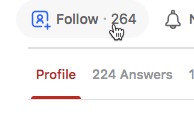
- By hovering their mouse over you name, and clicking follow
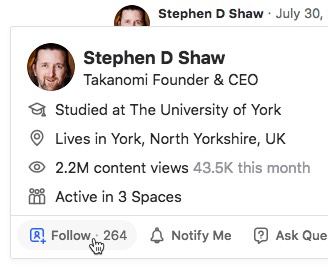
The best way to grow your audience is simply by regularly and consistently contributing content to the platform.
And the easiest way to do that is to add Quora into a post-publication pipeline for a primary content channel, such as your blog.
How Quora Ranks Your Answer
As you’d expect, the amount of visibility an answer achieves depends to a large extent on how high it gets ranked.
Most questions attract multiple answers, and Quora uses a number of factors to determine how to rank them on the page.
Their chief goal is to:
“...put the most comprehensive, trustworthy answers at the top of the page, so that they are easily accessible for people who have a question.”
So the best way to get a high ranking is to provide exactly that—comprehensive, trustworthy answers.
But how does Quora actually determine how high to place your answer?
One ranking factor used is Upvotes.
Quora users can choose to ‘Upvote’ your answer by simply clicking the button provided.

(They can also choose to downvote, another reason to aim for quality and value first).
But upvotes are just one ranking factor used.
Users are also sometimes shown the following box at the bottom of answers—this too feeds into how answers are ranked:

Clicking Yes or No just makes the box disappear—no opportunity to provide further feedback is provided.
Create quality answers that will attract as many upvotes and Yes answers as possible.
Note though that Quora doesn't take the voting stats at face value, and also takes into account “how trustworthy voters are in a given topic”.
Other ranking factors include:
- Previous answers you’ve provided
- Whether you’re an expert on the topic
- The type and quality of the content provided, including the actual text, images provided and links
In fact, Quora provides full guidelines on what it takes to get ranked highly on the platform and achieve wide distribution.
In summary, your answers should:
- Answer the question that was asked
- Provide knowledge that will be useful for lots of people interested in the question
- Demonstrate why your answer is accurate and helpful
- Demonstrate credibility, such as linking to reliable sources
- Be clear and easy to read, including for those skimming the page
Unlock Your FREE Custom Quora Marketing Action Plan
Want a personalized roadmap? Answer 3 quick questions, and get a tailored step-by-step strategy to leverage Quora for your business—it's 100% FREE!
Just hit the button now—it only takes a few seconds! →
Tracking Quora Traffic
To help judge the amount of traffic Quora is sending you, add some special parameters to the end of the link when linking back to your website from your answers or your profile.
This means Quora will appear in Google Analytics as a traffic source.
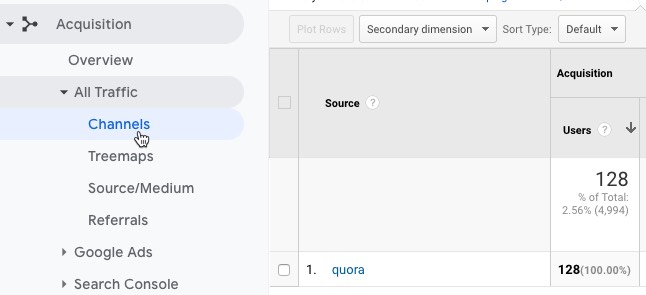
In its simplest form, you just need to add ?utm_source=quora to the end of the link.
So if I were to link to a post on this blog for example, it might look like this:
https://www.everywheremarketer.com/blog/rss-submission-sites?utm_source=quora
You can get more sophisticated if you want to by also including other UTM parameters, utm_medium and utm_campaign.
These provide more context to the link, potentially letting you see exactly which question the traffic came from.
If you want to do this, use Google’s Campaign URL Builder tool to create the link.
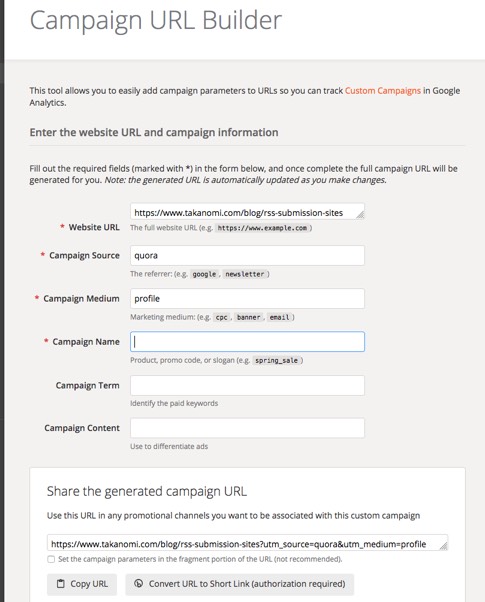
So for example, the Campaign Medium might be profile or question, indicating the type of content in Quora the traffic is coming from.
For questions, the Campaign Name might in some way indicate the exact question on Quora.
Personally, I use this finer level detail for my profile information, but not for individual questions.
(At the end of the day, it’s a trade-off between the additional time needed to create the links, and the level of benefit received for doing so. I prefer to keep question-level tracking as simple as possible.)
Remember:
- Even with this tracking in place, it only gives you a partial indication of the results you are getting from Quora. It doesn't for example tell you how many people are seeing your domain name in your credential, and visiting you that way..
- The level of traffic when you first get started will likely be miniscule compared to what you get a few months or years down the line from regular consistent action. That’s how content marketing works—don’t get hung up on it, it’s a long-term play.
How to Use Quora for Research
Quora gives you direct insight into exactly what people want to know about in relation to your niche.
You can also see just how popular certain questions are by looking at:
- The number of followers
- The number of answers
- The level of engagement answers receive (comments, shares, upvotes)
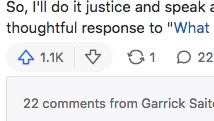
It’s fair to say that by using Quora as a research tool, there’s no real excuse for being unsure what to create content about for your market.
Using Quora is like going into a crowded room full of potential prospects for your business and hearing exactly what they:
- Are confused or unsure about
- Hold misconceptions about
- Are struggling or need help with
You’ll also see advice given to people in your market that you know is just downright wrong or misleading, that maybe you can help to correct with your own answers.
Think about how can you create content that’s authoritative, authentic and that actually gives people the information they are looking for?
Using Quora for research is as simple as:
- Searching for relevant keywords
- Looking at relevant topics
- Reviewing the questions that people are asking
- Drilling down into relevant questions for further analysis
When searching for keywords, note that by default Quora lists questions where the keywords are included in the question itself.
Change that to Answers for a list of answers that contain the keywords instead, giving you other questions and insights you may not have thought of.
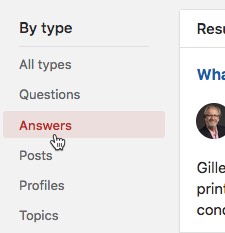
You can also use time filters to find the most recent questions that people are asking.
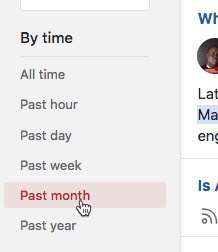
This also gives you insights into how popular certain keywords are on the platform, in terms of how regularly new questions are asked, and therefore where the most pressing content needs are at present.
Researching the competition...
Quora helps you analyze other products and services in your industry that people are using, recommending or otherwise talking about.
You can see exactly:
- Who you’re competing against
- What some of the common frustrations are with those other products and services
- What the potential opportunities might be for providing what people are really looking for
You may also of course see your own product or service referred to, showing you:
- How it stacks up against the competition
- Potential improvements that would be advantageous for your position in the marketplace
Frequently Asked Questions
How can I create a Quora account for marketing purposes?
Create a Quora account by clicking on Google or Facebook buttons or signing up with an email, then select at least ten relevant topics.
How can I use Quora effectively for marketing?
Use Quora to answer questions directly, provide value without overpromoting, link back to your site selectively, and engage regularly to build authority.
Why should Quora be part of my content marketing strategy?
Quora offers access to a large, affluent user base, drives website traffic, enhances search engine visibility, provides research insights, and builds brand authority.
What are the SEO benefits of using Quora?
Quora can increase search visibility through answers but doesn't directly boost your site's ranking due to no-follow links; however, it can lead to valuable backlinks and enhance overall SEO.
How can I use Quora for research purposes?
Search for keywords, review topics, analyze questions and answers, and utilize time filters to uncover popular topics, common misconceptions, and content gaps in your market.
To Conclude
This ultimate guide to using Quora for marketing has shown you everything from how to get started on the platform, to:
- Finding suitable questions to answer...
- Providing answers that generate traffic and leads for your business…
- And even how to use Quora for research to further benefit your business.
As frequently mentioned, and as with other content platforms, remember that the benefits of Quora come from regular, consistent action. So, for best results, make it a regular part of your content repurposing activities for your primary content channel.
By doing so, you're investing in a solid source of traffic, leads and other benefits for years to come.
This post provides more generalized advice, but you can also get a personalized roadmap showing you exactly what to do based on your business and what you want to achieve—click the button below to find out more:
Unlock Your FREE Custom Quora Marketing Action Plan
Want a personalized roadmap? Answer 3 quick questions, and get a tailored step-by-step strategy to leverage Quora for your business—it's 100% FREE!
Just hit the button now—it only takes a few seconds! →
